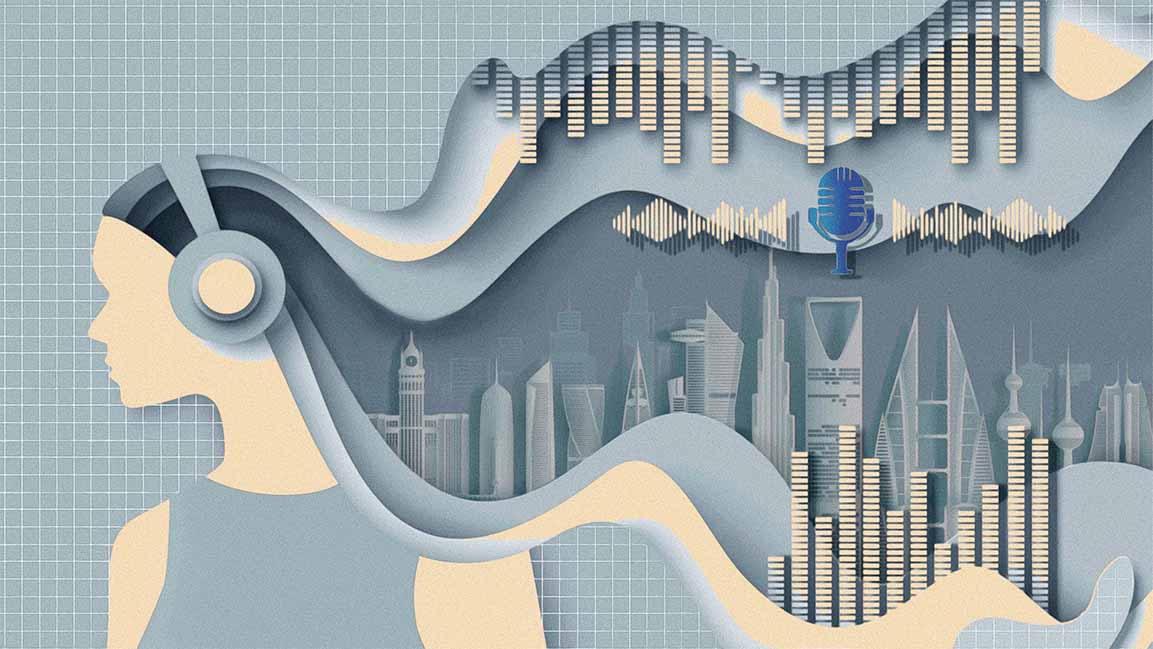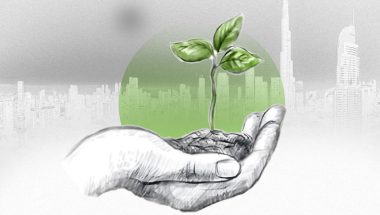- | 9:00 am
The Middle East wants to tell interesting stories. And podcasts seem to be the perfect platform
Middle East creators and agencies have started utilizing the medium to train the spotlight on the broad spectrum of voices from the region.

If it feels that everyone is starting a podcast these days, it’s because they are. While celebrities, thought leaders and influencers are turning to the platform as a creative outlet or an extension of their brand, in the Middle East, the podcast landscape is undergoing its organic evolution.
The rise of locally produced podcasts can be traced to restlessness among creators, many of whom do not feel voices from the region are being heard.
Such was the case for Chirag Desai, CEO of Amaeya Media. “As someone who grew up in this region, I became frustrated at how much of the content was centered around the US,” he says. “I thought it would be nice to get more things out of the region as a whole and that there was a certain perspective we could add to the conversations.”
By the end of 2017, Desai launched three shows under the umbrella of Amaeya Media, which has since launched more than 25 shows.
Malak Fouad echoes the same phenomenon. As the founder of A&T Media, a company specializing in creating audio content for the Middle East, she believes that voices in the region have “been misunderstood for decades.”
COMPLEMENT STORYTELLING
“There has been an awakening in our region to tell our own stories regardless of the medium,” she says. “A great example of this is a show like Finding Ola with Hend Sabry, which depicts a modern woman in Egypt coping with divorce. A show like Ramy showcases the perspective and struggles of an immigrant family in the US in a way mainstream hasn’t been exposed to. Podcasts can complement and extend this storytelling.”
Storytelling is at the heart of everything for Hashem Montasser, Founder of The Lighthouse, a UAE-based restaurant group in multiple locations in Dubai and Abu Dhabi.
Montasser says their foray into podcasting “came from a genuine curiosity to hear the stories of entrepreneurs that came through their space”. What started as physical talks gathering groups of 30-100 at the restaurant evolved into The Lighthouse Conversations, a podcast running for four years with almost 70 episodes.
“The spirit of the podcast has always been the same: highlighting stories from entrepreneurs in the region and getting their insights on their journey.”
INTIMACY, INDEPENDENCE, AND LOW COST
For Fouad, a journalist, a podcast’s intimacy and trust are unparalleled. “It’s like sitting at the next table and listening to an insightful conversation, which is unique to this medium.”
She adds that the lower barriers to entry are also where podcasts have an edge compared to other mediums, as it allows for the democratization of creation and distribution. “This allows newer companies to create and grow in the medium alongside established players; something is far less likely in traditional forms of media.”
Montasser agrees. “Resources are not very high to start a podcast. However, authenticity is key because the podcasts that do best are not the ones with celebrities. It’s when the host is genuinely interested in the medium and their guest and is consistent.“
Further highlighting the versatility of the medium, Desai discussed how the length of popular podcasts varies greatly to serve their topic best. “We tend to decide within 1-2 minutes if we don’t like something. In our surveys, we find a preference for podcasts at the 20–30-minute mark, not just because it makes sense for many topics but because, generally, people listen to podcasts during a commute, which lasts roughly around the same time, so it’s the sweet spot for our region.”
However, he adds there is no upper or lower limit, which lends itself to flexibility and creativity.
Also, the decentralized nature is an added benefit for podcasts. “Podcasting offers out-of-platform ownership of content and a level of independence that centralized platforms, such as Youtube, cannot. As a content creator, I can host my content in different ways, and listeners can tune in, in different ways, giving power of choice to people that might prefer one platform for its user experience over another,” adds Desai.
Additionally, while Apple and Spotify own between 60%-80% of listening in different markets, there are always new platforms, from bigger providers like Amazon Music to regional ones like Anghami and independent players like Overcast or PocketCasts.
“Essentially, there are many places in the ecosystem for everyone, which is an advantage.”
WHERE WE STAND TODAY
Over the years, there has been an update in awareness and listenership. Sharing her observations as host of What I Did Next, named one of Apple Podcasts’ Best Shows of 2021 and 2022, Fouad reports a 1.5x audience growth year-on-year, most of which is driven by Saudi Arabia, Egypt, and the UAE. “We also have a growing audience now in Oman and Kuwait.”
Weighing in, Desai says that although English shows still outnumber Arabic, there has been a shift to Arabic programming over the past couple of years.
For Montasser, The Lighthouse Conversations podcast has grown organically to have its own following, not only outside of the physical space it stemmed from but outside of Dubai, becoming an entry point for audiences to learn about the restaurant and concept store instead of being merely an extension of the space. “The key point is consistency,” he says.
BRANDING PERSPECTIVE
As part of a holistic marketing tool, Montasser believes podcasts are an underutilized tool. However, he admits it is not a primary revenue generator for the company. “When monetizing podcasts, it’s trickier,” he admits. “The advertising market is not very developed; as far as we know, not even 1% of all podcasts get the bulk of advertising money, so if that’s all you do, you need to think of your business model very well.”
Fouad says that while marketing departments in the region are aware of the potential of podcasts in their advertising arsenal, they are still deepening their understanding of the medium.
“We spend a considerable amount of time educating them and explaining the benefits of this model to them,” she says.
Desai adds that there is scope for more education to showcase the platform’s sheer potential. “Studies have shown that podcasts do better than TV and radio when creating a relationship of trust between host and listener,” he says. “That can be so advantageous to the brand.”
Studies show that listeners do not skip podcast ads, Fouad says. “So these messages are highly frequent. And because podcasts are an on-demand medium, with the user self-selecting what they want to hear, we can deliver timely and relevant advertising messages that resonate with them.”
The market is rapidly growing, and there are many opportunities for those looking to enter the market. As of the last count, there are 4 million podcasts globally. “It sounds like a lot, but when you break it down, less than 40% have published more than ten episodes. That is very little when you compare it to Youtube, which has 50 million channels. There is room to expand in the GCC region; there is a lot of space to create a podcast as mainstream as it has become.”
For those looking to create their podcast, Desai believes the critical aspect of starting is to ensure you add value to your audience. “Your north star is how you decide about every aspect of the show and where you begin your planning. Because a show built for everybody is a show for nobody.”








































